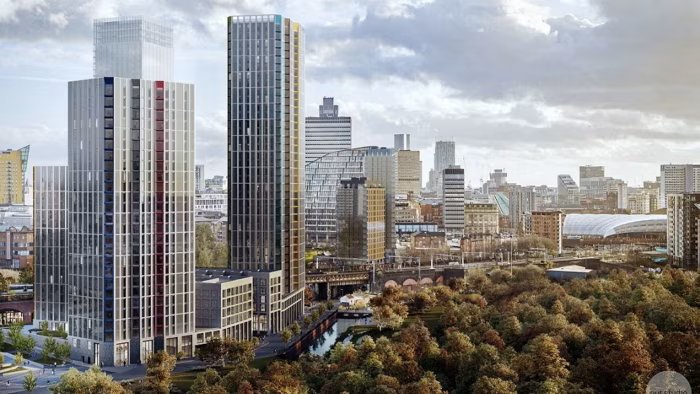Unlock the Editor’s Digest for free
Roula Khalaf, Editor of the FT, selects her favourite stories in this weekly newsletter.
Greater Manchester mayor Andy Burnham is to launch a £1bn public investment fund aimed at capitalising on the city region’s sustained economic growth.
The pot, to be announced by the Labour mayor on Thursday, will provide a mix of loans and equity to jump-start commercial and residential schemes, including lab space, prime office space and a proposed “new town”.
It will be the first fund of its kind, providing a scale, investment portfolio and combination of finances under local control not previously seen in UK cities.
Kendals, the listed former department store in the centre of Manchester, is expected to attract £44mn for an overhaul and transformation into commercial space.
A further £34mn has been earmarked for the Victoria North residential development in the north of the city, which was recently selected by a government task force as a potential “new town”.
A public-private partnership between Manchester council and developers FEC, the scheme intends to create 15,000 homes and expand the city centre dramatically over the next 15 years.

Sister, a science campus jointly set up by Manchester university and developer Bruntwood SciTech, is in line for a £20mn investment that would create new office and lab space focused on advanced manufacturing.
Local officials have assembled an initial £1bn for the fund, including national grants whose use Greater Manchester has some control over thanks to new devolved powers.
The rest will come from the Greater Manchester Pension Fund, one of the country’s largest local government pension schemes, alongside borrowing against retained business rates, potentially from the National Wealth Fund.
The fund will then operate on a recyclable basis, meaning that twice a year new investments are likely to be added to its portfolio as loans from existing investments are repaid and returns generated.
Greater Manchester’s economy has been growing faster than the national average for a decade and has registered a 31 per cent rise in productivity since 2004.
In a speech on Thursday, Burnham is expected to promise “good growth”, describing the fund as a “serious, practical plan” and dismissing “a busted trickle-down theory that puts the pursuit of pure economic growth before basic needs”.
People familiar with the fund said it would provide a blend of finance, including investments intended to generate faster returns from city centre developments, as well as longer-term patient capital, which accrues slower returns.

Other initial investments include new homes around Rochdale railway station and a garden village in Tameside, which has been in development for some years.
The pot has echoes of the Housing Investment Fund, a £300mn facility set up by Greater Manchester and then-Conservative chancellor George Osborne a decade ago.
That recyclable fund will now be subsumed into the new pot, having provided loans for a series of residential skyscrapers that have since transformed Manchester’s central skyline.
The HIF has also proved controversial, with critics questioning why public sector finance was needed to build luxury apartments.
Burnham, who earlier this year launched a thinly veiled pitch to replace Sir Keir Starmer as prime minister, is especially keen to promote the new fund’s benefits to outlying towns of Greater Manchester rather than the city centre.
Senior Labour figures are worried about strong results for Reform UK in next May’s local elections in England after the rightwing populist party secured majorities in 10 councils this spring.
Still, the most fleshed-out projects in line for initial investment are in the city centre, where returns are higher and likely to be faster.

